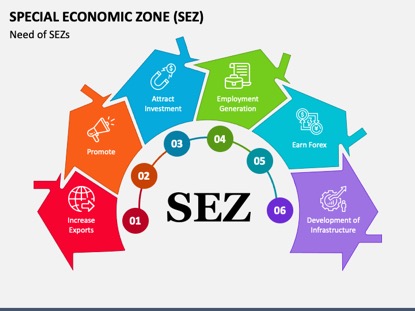
While such a country would serve as a market exclusively for goods produced far afield or in other countries, its economy would at the same time continue to experience serious challenges with balance of payments, forex shortage, rapid inflation, job scarcity, income poverty, and hardship, to cite but a few.
It is vital therefore that our development planners, economic thinkers, trade and commerce facilitators, and private sector operators provide the impetus for the country to attract more investments, and embark on value addition to raw materials and exportation of finished goods. And one of the effective vehicles today to do that is to have in place a formidable Special Economic Zone (SEZ).
SEZ is a designated industrial hub in a country that is subject to more favourable economic regulation. It thrives on new and productive value chains, spurs a circular local economy to generate exportable commodities, and enhance supply chains for goods. Its objectives include attracting investment, increasing trade, creating jobs and employment, and influencing effective economic administration and regulation.
The plan of having a special economic zone in The Gambia is actually in place, as the Trade Ministry is looking at the direction of enhancing industrialisation in the country, frightened not by the obstacles or challenges that would rear up in the process of getting it up and running. Success is always achieved at overcoming challenges.
In the realm of industrialisation, the 2024 National Budget states, the Ministry is actively pursuing the construction of a Special Economic Zone (SEZ) along the Trans Gambia Bridge corridor. It says a “feasibility study has been commissioned to assess the viability of this project, and efforts are underway to mobilise resources for the necessary infrastructure”. Furthermore, the Ministry “plans to establish three additional agropolis, to strategically focus on value chain crops” along recognised trade corridors.
Such a move is in the right direction, to say the least. There are financiers and funding organisations the Ministry or the Government could collaborate with to invest in such a lucrative project, one of which is the Africa Finance Corporation (AFC).
The AFC, established in 2007 by sovereign African states, is out to provide practicable solutions to Africa's infrastructure deficit and challenging operating environment. It is already bridging the infrastructure investment gap through the use of SEZs in some African states such as Gabon, Benin and Togo, and intends to stretch its tentacles to Cote d’Ivoire and Chad to engage in the processing of local agricultural products.
SEZs have been established in many countries around the world to attract investment, beef up industrialisation and create jobs, despite the challenges of starting the venture. According to the World Bank, China has successfully leveraged SEZs for economic transformation.
SEZs have contributed 22% of China's GDP, 45% of total national foreign direct investment, and 60% of exports. SEZs are estimated to have created over 30 million jobs, increased the income of participating farmers by 30%, and accelerated industrialisation, agricultural modernisation, and urbanisation. (World Bank)
Via the vehicle of SEZs, Gabon in Africa, for instance, has developed a successful wood-based export industry that has utilised or exploited that country’s forests to produce classic furniture. Gabon, according to the African Business magazine, is today the second-biggest exporter of sawn wood in Africa and the tenth globally.
Gabon SEZ, the magazine reported recently, has contributed $842m to the country’s GDP, created 8,200 direct and 26,000 indirect jobs, attracted 107 industrial, commercial, and residential investors that have collectively invested $1.7bn (11% of 2020 GDP) into the non-oil economy. The GSEZ generated $1bn of wood product exports in 2019 (equivalent to 10% of GDP) compared to $350m in 2010.
Regarding applying SEZ successfully, the African publication reports: “Investment in special economic zones and industrial hubs with focused interventions is regarded by mutilateral and other finance institutions as a way to dramatically improve existing value chains and logistics and create new opportunities for value-added products.
“It is also proving to be an effective way to develop new chains and export capability in countries that have long been import dependent despite their wealth of agricultural and other resources.
“The success of such ventures relies on many factors, key among them the political will to back transformation with suitable policy frameworks according to speakers at the recent Africa Investment Forum. These urged African governments to be bold in taking the steps towards building value for their natural resources. This is a key step but there are other factors required in building successful industrial packs.
“These factors include reducing bureaucracy by putting in place effective one-stop shops and other agencies; building relevant skills; and providing infrastructure to attract companies into the zones - particularly reliable energy supply.
“AFC has proved the efficacy of this model in its investment in industrial parks alongside industrial development company ARISE Integrated Industrial Platforms (IIP) in various African countries.
“The model is to build integrated ecosystems and industrial platforms that develop on end-to-end value chain around a particular natural resource.” (African Business - Dec/Jan 2024).
Through SEZ, Gambia could transform and add value to its potential export commodities such as peanuts, fish and cotton to generate wealth for the country. It could as well beef up investment, spark manufacturing, increase export and create jobs.
Therefore, the way to go is effective industrialisation via SEZ. Industrialisation leads to economic growth by creating jobs, increasing productivity, and driving innovation. It as well improves living standards by providing access to essential goods and services for a nation. So, the ball is in the court of the Trade Ministry and the government.



